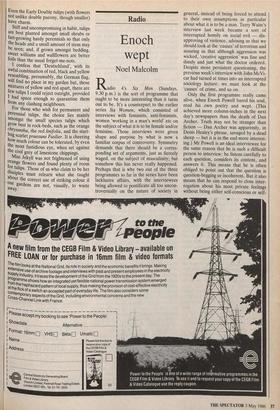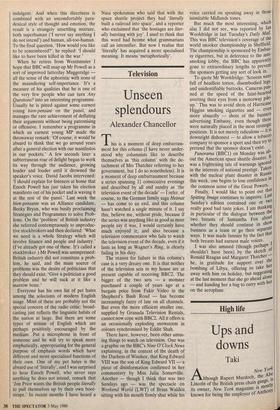Radio
Enoch wept
Noel Malcolm
Radio 4's Six Men (Sundays, 9.30 p.m.) is the sort of programme that ought to be more interesting than it turns out to be. It's a counterpart to the earlier series Six Women, which consisted of interviews with feminists, anti-feminists, women 'working in a man's world' etc on the subject of what it is to be female and/or feminine. Those interviews were given shape and purpose by what is now a familiar corpus of controversy. Symmetry demands that there should be a corres- ponding set of arguments, just as fiercely waged, on the subject of masculinity; but somehow this has never really happened. Perhaps that is why two out of the three programmes so far in the series have been lacklustre affairs, with the interviewees being allowed to pontificate all too uncon- troversially on the nature of society in
general, instead of being forced to attend to their own assumptions in particular about what it is to be a man. Terry Waite's interview last week became a sort of interrupted homily on social evil — dis- approving of violence, advising us that we should look at the 'causes' of terrorism and assuring us that although aggression was wicked, 'creative aggression' was fine and dandy and just what the doctor ordered. Despite more persistent questioning, the previous week's interview with John McVi- car had turned at times into an interrupted sociology lecture: we must look at the 'causes' of crime, and so on.
Only the first programme really came alive, when Enoch Powell bared his soul, read his own poetry and wept. (This achieved more column-inches in the next day's newspapers than the death of Dan Archer. Truth may not be stranger than fiction — Dan Archer was apparently, in Denis Healey's phrase, savaged by a dead sheep — but it is in the end more interest- ing.) Mr Powell is an ideal interviewee for the same reason that he is such a difficult person to interview: he listens carefully to each question, considers its content, and answers it. This means that he is often obliged to point out that the question is question-begging or incoherent. But it also means that he can respond to close inter- rogation about his most private feelings without being either self-conscious or self- indulgent. And when this directness is combined with an uncomfortably para- doxical style of thought and emotion, the result is a strangely unsettling mixture, both superhuman CI never say anything I do not intend') and human, all-too-human. To the final question, 'How would you like to be remembered?', he replied: 'I should like to have been killed in the war.'
When he retires from Westminster I hope that BBC will snap up Mr Powell as a sort of improved latterday Muggeridge — all the sense of the aphoristic with none of the maundering self-importance. It's a measure of his qualities that he is one of the very few people who can turn Any Questions? into an interesting programme. Usually he is pitted against some earnest young bien-pensant on the panel, and manages the rare achievement of deflating their arguments without being patronising or offensive. I remember a programme in which an earnest young MP made the throwaway remark: 'Of course, it would be absurd to think that we go around years after a general election with our manifestos in our pockets.' A few seconds later a subterranean roar of delight began to work its way through the audience, growing louder and louder until it drowned the speaker's voice. David Jacobs intervened: 'I should explain for listeners at home that Enoch Powell has just taken his election manifesto out of his pocket and is waving it at the rest of the panel.' Last week the bien-pensante was an Alliance candidate, Becky Bryan, who was busily proclaiming Strategies and Programmes to solve Prob- lems. On the 'problem' of British industry she referred contemptuously to unproduc- tive stockbrokers and then declared: 'What we need is a whole Strategy which will involve finance and people and industry.' (I've already got one of these. It's called a stockbroker.) Mr Powell was unimpressed: British industry did not constitute a prob- lem, he said, and the main source of problems was the desire of politicians that they should exist. 'Give a politician a good problem and he will suck at it like a marrow bone.'
Everyone has his own list of pet hates among the solecisms of modern English usage. Most of these are probably not the special concern of the radio critic: broad- casting just reflects the linguistic habits of the nation at large. But there are some types of misuse of English which are perhaps positively encouraged by the medium. Put a microphone in front of someone and he will try to speak more emphatically, appropriating for the general purpose of emphasis words which have different and more specialised functions of their own. One of my pet hates is the absurd use of 'literally', and I was surprised to hear Enoch Powell, who never says anything he does not intend, remark that 'Jim Prior wants the British people literally to pull themselves up by their own boot- straps.' In recent months I have heard a Nasa spokesman who said that with the space shuttle project they had 'literally built a railroad into space', and a reporter who exclaimed that 'the hostages are liter- ally bursting with joy'. I used to think that this word had bcome what grammarians call an intensifier. But now I realise that 'literally' has acquired a more specialised meaning. It means 'metaphorically'.



















































 Previous page
Previous page